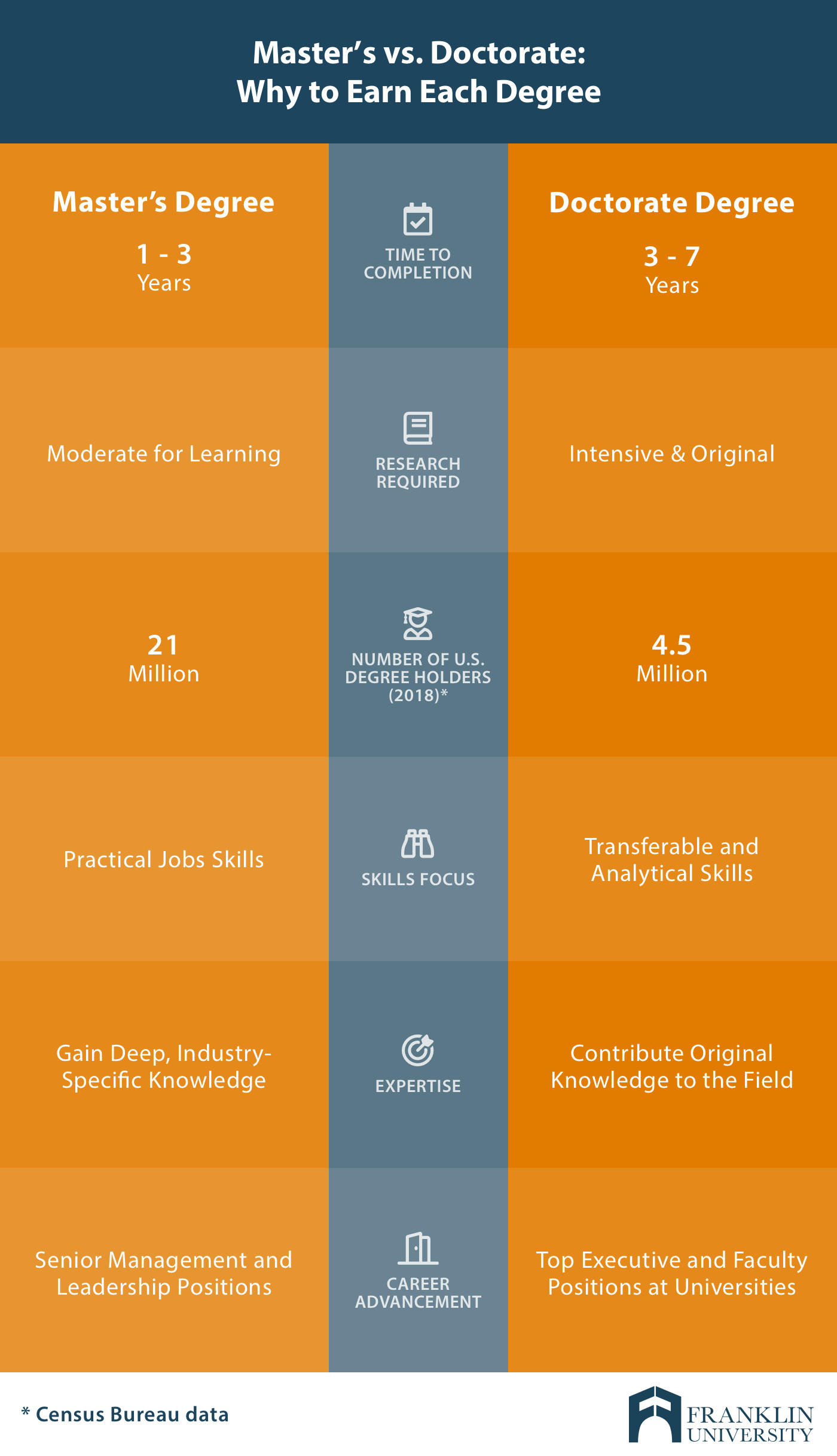Choosing the right path for higher education can feel like navigating a complex maze. When it comes to graduate studies, the decision between a master’s degree and a doctorate is a pivotal one. Both degrees represent significant achievements, but they cater to different career aspirations and learning objectives. Understanding the core differences between a Doctorate Vs Masters is crucial for making an informed choice that aligns with your professional goals.
This guide will delve into a comprehensive comparison of doctorate and master’s degrees, examining program requirements, curriculum focus, costs, career outcomes, and more. By exploring these distinctions, you can gain clarity on which degree best suits your ambitions and sets you on the path to success.
 Students studying together on campus lawn
Students studying together on campus lawn
Decoding Program Requirements: Masters vs Doctorate
Embarking on either a master’s or doctorate program demands a substantial investment of time, effort, and financial resources. Before making your decision, it’s essential to grasp the typical prerequisites for admission and the commitments needed for successful completion.
Generally, a master’s degree program is often seen as the next step after a bachelor’s degree. Admissions criteria usually include a bachelor’s degree from an accredited institution, transcripts, letters of recommendation, and sometimes standardized test scores like the GRE or GMAT, depending on the field. The duration of a master’s program typically ranges from one to two years of full-time study.
Doctorate programs, on the other hand, are more advanced and often require a master’s degree as a prerequisite, though some programs offer direct entry after a bachelor’s for exceptional candidates. Admission is highly competitive and usually involves a rigorous application process that includes not only academic records and recommendations but also a statement of purpose outlining research interests and career goals, and often a research proposal. Doctorate programs are significantly longer, typically taking four to seven years to complete, often involving comprehensive exams and a dissertation.
Understanding these differing requirements upfront can help you gauge your preparedness and the level of commitment required for each path.
Curriculum and Content: What to Expect in a Masters and a Doctorate
The fundamental purpose and design of master’s and doctorate programs differ considerably, leading to distinct curricula and coursework.
A master’s degree is primarily designed to enhance and deepen your knowledge and skills within a specific professional field. The curriculum is career-focused, aiming to equip graduates with advanced competencies for specialized roles in various industries. Coursework in a master’s program typically encompasses core subjects vital to the discipline, elective courses for specialization, and a culminating capstone project or thesis to apply learned knowledge.
Doctorate programs, conversely, are research-intensive and geared towards developing scholars and researchers who can contribute original knowledge to their field. The curriculum emphasizes rigorous research methodologies, critical analysis, and scholarly writing. Doctorate coursework includes advanced subject-specific classes, a research core focused on research skills, comprehensive exams to assess mastery of the field, and a substantial dissertation based on original research.
Master’s Program Coursework: A Closer Look
Master’s degrees commonly structure their curriculum around three main types of courses:
- Core Courses: These are mandatory courses providing foundational knowledge essential for expertise in the chosen field. They establish a common understanding and skill set for all students in the program.
- Electives: Elective courses offer the opportunity to specialize in a niche area within the broader discipline or to broaden knowledge across related fields. This allows for customization of learning to match individual career interests.
- Capstone or Thesis: Serving as the program’s culmination, the capstone project or thesis requires students to apply their accumulated knowledge to a research question or practical problem. It often involves independent research, data analysis, and a formal presentation of findings.
Doctorate Program Structure: A Research-Centric Journey
Doctorate programs are structured in a phased manner, typically involving these key components:
- Coursework: Doctoral coursework is advanced and intensive, designed to provide a deep understanding of the discipline’s theoretical and methodological underpinnings. It prepares students for the comprehensive exams.
- Research Core: This component focuses on developing advanced research skills, including quantitative and qualitative methodologies, data analysis, and scholarly writing. It lays the groundwork for the dissertation research.
- Comprehensive Exams: These exams assess a student’s mastery of the core knowledge and concepts acquired through coursework. Passing the comprehensive exams is a critical milestone, allowing progression to the dissertation phase.
- Dissertation: The dissertation is the centerpiece of a doctoral degree. It involves identifying an original research question, conducting in-depth research, analyzing findings, and writing a substantial scholarly document that contributes new knowledge to the field. The dissertation process is supervised by a committee of faculty experts, and culminates in a formal defense of the research.
Reflecting on these differences in curriculum and content is vital in determining whether a master’s or doctorate aligns better with your learning style, academic interests, and professional aspirations.
Financial Considerations: Cost of a Masters vs Doctorate
Cost is a significant factor for most individuals considering graduate education. However, estimating the precise cost of a master’s or doctorate can be challenging due to various influencing factors. Master’s degree costs can vary widely, ranging from approximately $30,000 to $120,000 in total. Doctorate degree costs exhibit a similar broad range, and can sometimes be even higher depending on the field and program duration.
Several key elements contribute to the overall expense of both types of degrees:
- Type of Institution: Public, private non-profit, and for-profit universities have different tuition structures. Public universities are often more affordable for in-state residents, while private institutions generally have higher tuition fees. University reputation and rankings can also influence tuition costs.
- Program Duration and Enrollment Intensity: The time it takes to complete a degree and the number of courses taken per term impact the overall cost. Doctorate programs, being longer and research-intensive, can accrue higher costs. The time dedicated to dissertation research significantly affects the total duration and thus the cost. Balancing personal and professional commitments with study load also plays a role in program length and expense.
- Transfer Credits and Prior Learning Recognition: Prior graduate-level coursework or professional certifications might qualify for transfer credits, potentially reducing the total number of credits needed and the overall cost.
It’s crucial to remember that pursuing a doctorate often necessitates first completing a master’s degree. Therefore, when considering finances, evaluate the value proposition of different institutions and programs. In some cases, pursuing both a master’s and a doctorate at a more affordable institution might be more cost-effective than a master’s alone at a high-tuition university.
Career Outcomes and Earning Potential: Masters vs Doctorate
When evaluating the return on investment for a master’s or doctorate, examining career outcomes, skill development, and salary expectations is essential. Both degrees enhance career prospects, but in distinct ways.
- Skillset Development: Master’s programs focus on honing industry-specific skills and cultivating critical thinking and problem-solving abilities applicable to professional settings. Doctorate programs, in contrast, heavily emphasize research, analytical, and writing skills, fostering transferable competencies valuable for addressing knowledge gaps and contributing to advancements in a field.
- Career Trajectories: Master’s degrees are widely recognized as career-advancing credentials, preparing graduates for management and leadership roles within organizations. Doctorate degrees are increasingly becoming the standard for top executive positions, research-oriented careers, and faculty positions in academia. They open doors to careers focused on innovation, research, and thought leadership.
- Salary Expectations: Both master’s and doctorate degrees are associated with significant increases in earning potential compared to a bachelor’s degree alone. Data from the Bureau of Labor Statistics (BLS) indicates that master’s degree holders can expect to earn approximately 17% more than those with only a bachelor’s degree, while doctorate holders can command salaries about 30% higher. Lifetime earning potential also reflects this difference, with master’s degree holders potentially earning over $2.8 million and doctorate holders exceeding $3.5 million over their careers, according to U.S. Census Bureau data.
 Comparison chart of Masters vs Doctorate degrees, outlining reasons to pursue each degree type.
Comparison chart of Masters vs Doctorate degrees, outlining reasons to pursue each degree type.
Weighing the Benefits: Master’s or Doctorate for Your Goals?
Choosing between a master’s and a doctorate requires careful consideration of your long-term career goals, personal interests, and learning preferences. As you evaluate these graduate degree options, keep these key comparison points in mind to align your choice with your aspirations:
- Career Objectives: Are you aiming for advanced professional practice, leadership roles in industry, or a research-focused or academic career? A master’s might be ideal for the former, while a doctorate is generally more suited for the latter.
- Research Interest: Do you have a passion for in-depth research and contributing original knowledge to your field? A doctorate program provides the platform and training for this pursuit. If your interest lies more in applying existing knowledge to solve practical problems in your profession, a master’s could be more fitting.
- Time Commitment: Are you prepared for the extended time commitment of a doctorate program, typically involving several years beyond a master’s? Consider your life stage, financial situation, and career timeline when assessing this factor.
- Financial Resources: Evaluate the financial implications of both degree paths, considering tuition costs, living expenses, and potential funding opportunities like scholarships and assistantships. Factor in the potential return on investment in terms of future earning potential.
Online Graduate Degrees: Expanding Accessibility
The increasing demand for advanced education has spurred the growth of online master’s and doctorate programs. Online degrees offer working professionals and individuals with geographical constraints the flexibility to pursue graduate studies without disrupting their careers or relocating.
Online programs provide the same rigorous curriculum and learning outcomes as traditional on-campus programs, leveraging technology to deliver engaging learning experiences. If flexibility and accessibility are key considerations for you, exploring online master’s and doctorate options can broaden your choices and make graduate education more attainable.
Ultimately, the decision between a doctorate vs masters degree is a personal one. By carefully evaluating your career goals, academic interests, financial considerations, and learning preferences, you can make an informed choice that sets you on the right path to professional fulfillment and success.


